We're movingpublished at 04:03 GMT 21 November 2023
Thanks for staying with us. We're moving to a new live page and you can follow our coverage here.
US President Joe Biden has indicated a deal could soon be agreed that would involve Hamas releasing hostages from Gaza in exchange for pauses in fighting
The International Committee of the Red Cross (ICRC) has further raised hopes of a deal by saying its head will meet Hamas. The ICRC has helped facilitate previous deals
A group of 28 premature babies have crossed into Egypt after being evacuated from Gaza's besieged al-Shifa hospital - and 12 have been flown to Cairo for more treatment
Earlier, the Hamas-run health ministry in Gaza said an Israeli air strike on a different hospital killed at least 12 people
Israel said its troops had come under fire "from within" the hospital, and that it "directly targeted the specific source of enemy fire" - but did not fire shells toward the hospital
The Hamas-run health ministry in Gaza says 13,300 people have been killed in the territory since Israel began its campaign against Hamas
Israel began attacking Gaza after Hamas fighters crossed the border on 7 October and went on to kill 1,200 Israelis and take more than 200 others hostage
Edited by Alex Binley
Thanks for staying with us. We're moving to a new live page and you can follow our coverage here.
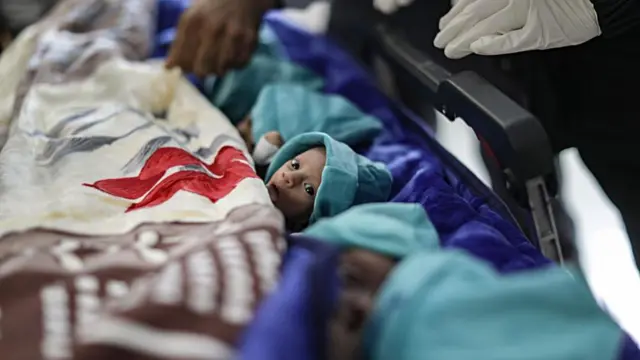 Image source, EPA
Image source, EPAA premature baby being prepared for evacuation from Gaza's al-Shifa hospital
It's just gone 02:30 in Israel and Gaza - and 00:30 London time. Here's a look at some of the latest headlines:
Hopes for hostage deal
US President Joe Biden says a deal that would see Hamas releasing hostages could be close. Asked by a reporter whether a rumoured agreement was near, he said: "I believe so".
The International Committee of the Red Cross (ICRC) - a humanitarian organisation which facilitated previous hostage releases - says its boss has travelled to Qatar to meet with Hamas. The development has further raised hopes that an agreement could be imminent.
Our Jerusalem correspondent Tom Bateman says any deal could be staggered - with groups of hostages freed at a time, in return for a sustained ceasefire.
Babies reach Egypt
Twenty-eight out of 31 premature babies who were evacuated from the besieged al-Shifa Hospital in Gaza on Sunday have now been taken into Egypt.
The World Health Organization (WHO) says 12 of them have been flown to Cairo for further treatment - all of whom are fighting "serious infections and other conditions".
More shooting reported by hospital head
The director of Gaza's Indonesian Hospital has told the BBC there is still “intermittent shooting” being heard at the site.
The World Health Organization has labelled an earlier attack on the building - which Hamas said killed 12 people - as "appalling".
The hospital director said he believed the strike came from Israeli forces. The Israeli military said it had come under fire "from within" the hospital and retaliated, but insisted it did not fire shells toward the hospital.
Gaza death toll climbs
The Hamas-run health ministry in Gaza now says 13,300 Palestinians have been killed in Israel's offensive. Of that figure, at least 5,600 of the dead are children.
Israel began its operation following an attack by Hamas on 7 October that killed 1,200 people.
Earlier, we looked at Israeli media reports on hostages' relatives walking out of a tense meeting with Prime Minister Benjamin Netanyahu and other senior politicians.
One family member reportedly said that at the meeting, the impression was given that the government's goal of destroying Hamas was "equally important" to freeing the hostages taken by the group.
Now, Netanyahu has shared a post on X, formerly Twitter, insisting he "listened to the pain of the families" during that meeting.
He says the hostages are "always in my heart" and bringing them back is a "supreme" task.
"We will not stop fighting until we return our hostages home, destroy Hamas and ensure that there is no more threat from Gaza," he says.
We've been reporting on Israeli tanks surrounding the Indonesian Hospital in northern Gaza after 12 people were reportedly killed there last night.
Now a spokesperson for the Hamas-run health ministry is saying around 200 patients have been evacuated from the hospital, according to the AP and AFP news agencies.
He says many have been taken by bus to Nasser Hospital in the southern city of Khan Younis, and the Red Cross are helping to evacuate the remaining 400 patients.
A few hours ago, the hospital's director said "intermittent shooting" could still be heard on the premises.
More now on highly-charged meeting between the families of hostages and Israeli politicians.
In one incident in Israel's parliament, relatives pleaded with far-right members of Israel's governing coalition not to introduce legislation to allow the use of the death penalty against Hamas, saying it could endanger hostages.
In response, some ultra-nationalist lawmakers accused the families of siding with Hamas by attempting to slow down the controversial bill.
Gil Dickmann, whose aunt was killed by Hamas and whose two cousins are among the hostages, was among the relatives who took part in the confrontation.
He told the BBC World Service's Newshour programme he thought the politicians had "crossed a line" with the allegation and accused far-right leader and government minister Itamar Ben-Gvir of "doing whatever to spark more and more violence, more and more hate".
"Our trust in the government was lost on 7 October," Mr Dickmann said.
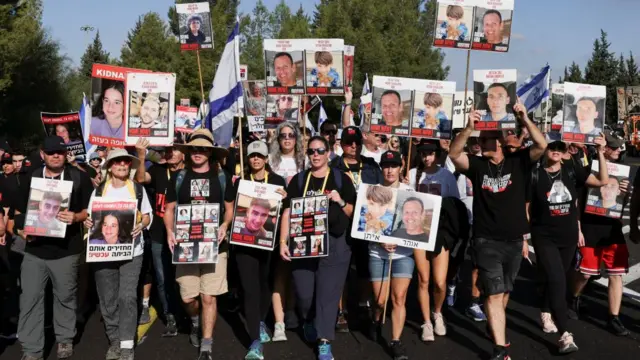 Image source, Reuters
Image source, ReutersRelatives of hostages and their supporters have called for more to be done to retrieve them
Family members of hostages being held by Hamas are reported to have met with Israel's war cabinet - including the prime minister - and walked out.
A cousin of hostage Tal Chaimi told local outlet Channel 12 that an earlier meeting with two members of the war cabinet - Benny Gantz and Gadi Eisenkot - had given him the strong impression the hostages was the "top priority".
But the cousin said he had emerged from Monday's meeting - with the full cabinet - with the impression that the government's goal of destroying Hamas was "equally important" to freeing the hostages taken by the group.
"We all feel, especially when we’re talking about our families, that this should be the top priority,” he added.
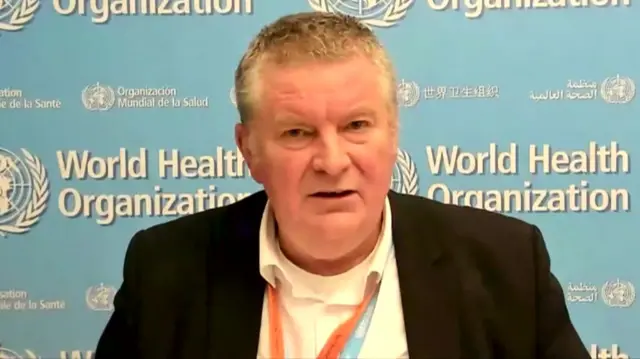 Image source, Reuters
Image source, ReutersThe World Health Organization (WHO) says there is a risk of a disease outbreak in Gaza that could equal the injuries of war - as Palestinians flee conflict zones amid torrential rain, and pack into refuge centres.
"This is an absolute recipe for large scale epidemics", its executive director of emergencies Michael Ryan said. Ryan suggested the public health risk could "begin to approach the same level as the injury crisis that we have and the crisis in the hospitals".
He added children were at particular risk: "The sudden drop in temperature is going to create a problem with pneumonia... The stress that those kids are under, the attritional status that those children have, make it a recipe for epidemic."
He said Israeli orders for Palestinians who had fled south to now move further west would increase the concentration of people in refuge camps - making things even worse.
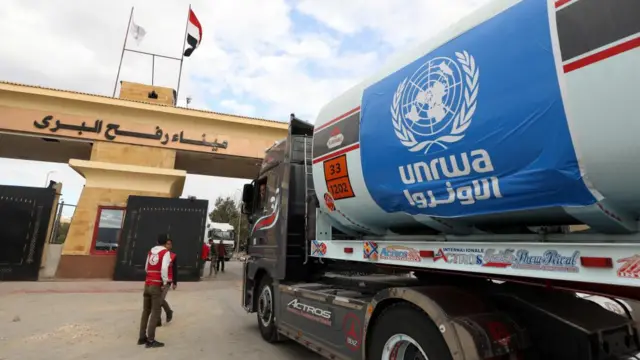 Image source, EPA
Image source, EPAA fuel truck crosses into Gaza from Egypt
The US has also said that fuel has reached Gaza - following Israel's announcement on Sunday that it would allow supplies to support non-governmental organisations (NGOs).
"We are now tracking that six trucks have crossed into Gaza with approximately 18,000 gallons of fuel - that will help support food distribution and help generators for the hospital so that they can keep working," White House national security spokesman John Kirby said.
The International Rescue Committee (IRC) earlier said that aid reaching Gaza was not enough - and that while the conflict persisted, staff were unable to do their humanitarian work.
"The scale of suffering therefore requires a massive and sustained humanitarian assistance effort, and civilians must have protection that is gravely absent - this demands an end to the fighting," a statement from the organisation said on Monday.
A short update has recently reached us from the US - giving a sense of how many Americans have been affected by this conflict.
State Department spokesman Matthew Miller is quoted by the Reuters news agency as saying that six US citizens have been killed since 7 October. Five of them were reportedly Israeli troops, and the sixth was a police border officer.
Miller says there are just over 1,200 Americans, legal permanent residents and their family members still in Gaza.
Sirens have interrupted a protest in Tel Aviv - as Israel's air defence system intercepted an apparent attack.
Demonstrators had gathered outside the Unicef building - to call for more action by the UN agency to help secure the release of hostages being held by Hamas in Gaza, some 40 of which are children.
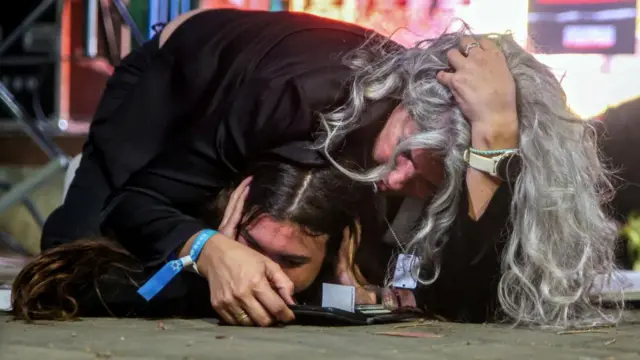 Image source, Reuters
Image source, Reuters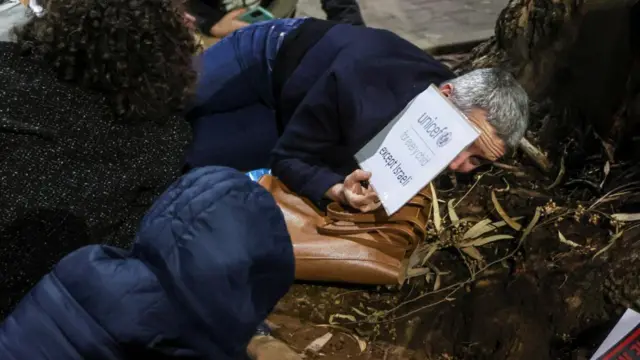 Image source, Reuters
Image source, ReutersProtesters chanted "UN, do your job" before the siren interrupted the demonstration
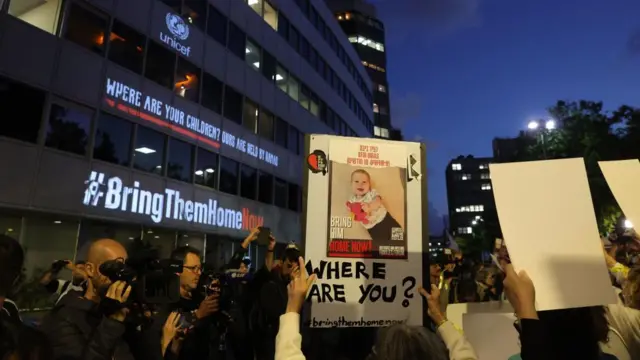 Image source, EPA
Image source, EPAProtesters carried signs featuring child hostages, as messages were projected onto the building
Imogen Foulkes
Reporting from Geneva
The International Committee of the Red Cross (ICRC) says its president has travelled to Qatar to meet Hamas and Qatari government representatives, in a bid to "advance humanitarian issues related to the armed conflict in Israel and Gaza".
Mirjana Spoljaric’s trip - and in particular the meeting with Hamas - will fuel speculation that a release of Israeli hostages may be imminent. The ICRC stresses it does not take part in negotiations leading to hostage releases, but is there to facilitate any deal that's agreed.
That's what happened with the four hostages who have been freed so far: Qatar negotiated with Hamas, and then the ICRC retrieved the hostages from agreed locations and brought them back to Israel.
The ICRC prides itself on talking to all sides in a bid to remind them of the laws of war, and to gain access to prisoners of war and detainees. After 9/11, it maintained contact with the Taliban even as Nato forces scoured Afghanistan for Taliban groups suspected of hiding Osama bin Laden.
Some in Israel have asked why the ICRC has not visited the hostages in Gaza. Today, the ICRC said it had persistently called for their release, and asked for access in order to check on their welfare -but explained that "agreements must be reached that allow the ICRC to safely carry out this work".
It continued: "The ICRC cannot force its way in to where hostages are held, nor do we know their location."
As the conflict continues, here are a few photos that showing life in the Gaza Strip after 45 days of fighting.
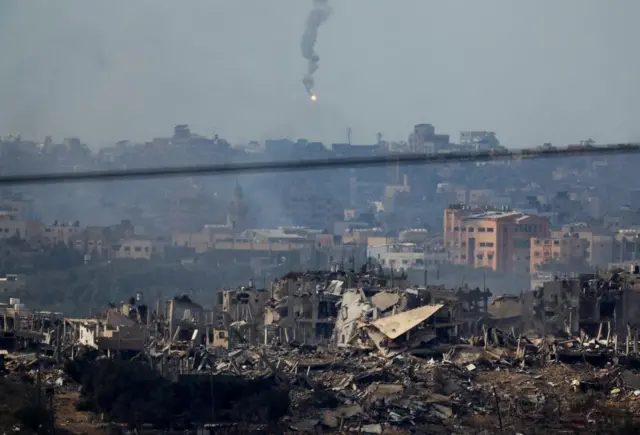 Image source, Reuters
Image source, ReutersA flare fired by the Israeli military flies over Gaza, as seen from southern Israel
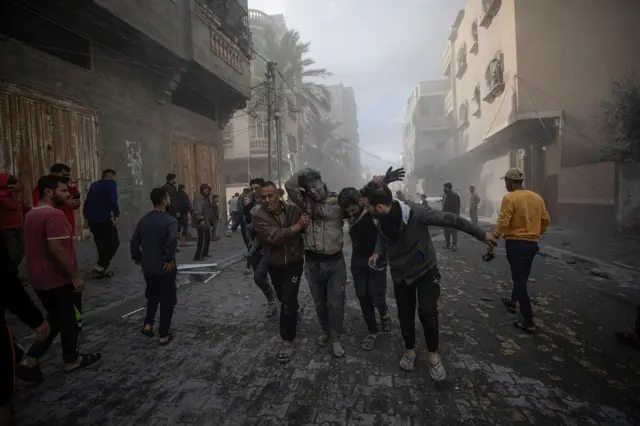 Image source, EPA
Image source, EPAThe aftermath of alleged air strikes in Rafah
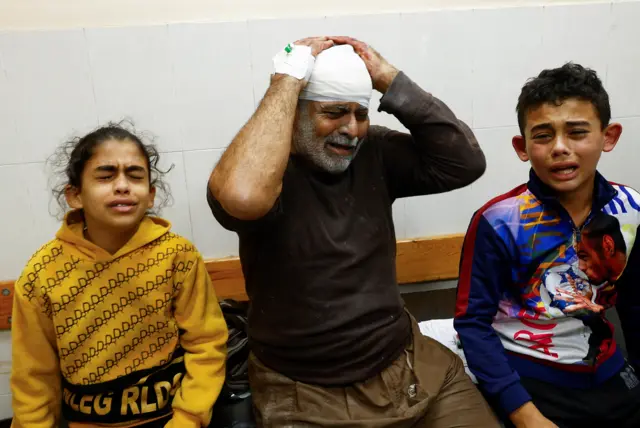 Image source, Reuters
Image source, ReutersInside Nasser hospital in Khan Younis
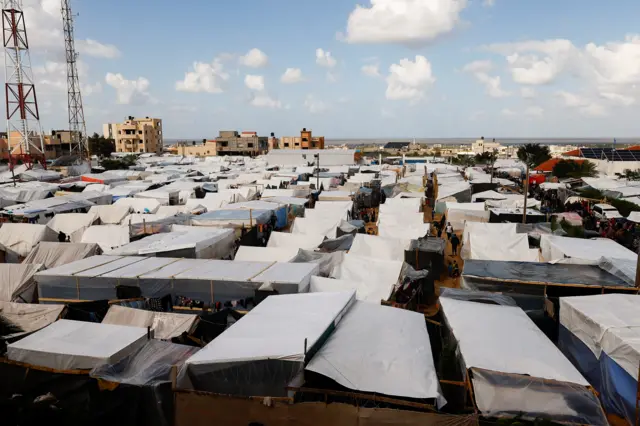 Image source, Reuters
Image source, ReutersA tent camp for displaced Palestinians in Khan Younis
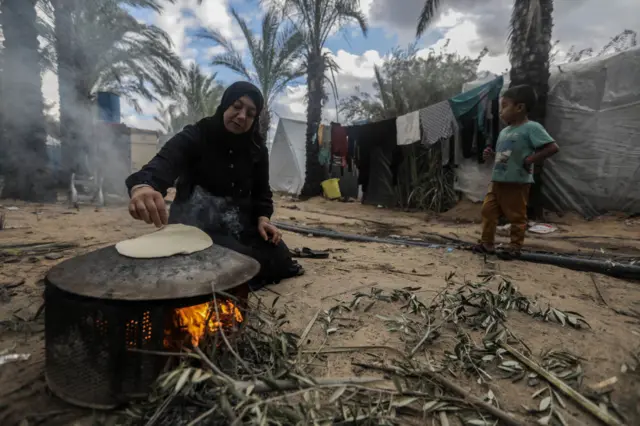 Image source, Getty Images
Image source, Getty ImagesA displaced woman bakes bread - again in Khan Younis
 Tom Bateman
Tom Bateman
Middle East correspondent, reporting from Jerusalem
There is still “intermittent shooting” being heard at the Indonesian Hospital in northern Gaza according to Dr Marwan al-Sultan, the hospital director.
In messages passed onto the BBC, he says there are some 500 patients remaining inside.
We reported earlier how World Health Organisation (WHO) chief Dr Tedros Adhanom Ghebreyesus said he was "appalled" by an attack on the hospital.
Al-Sultan had described this as a deadly Israeli strike. The Israeli military said its troops had fired back at gunmen who shot at them from the hospital - and that it took "numerous measures to minimise harm" to non-combatants.
Al-Sultan says tonight there is “some news” that two buses will be sent to evacuate wounded people requiring surgery, destined for southern Gaza.
“Still we are waiting, nobody knows what will happen,” he says.
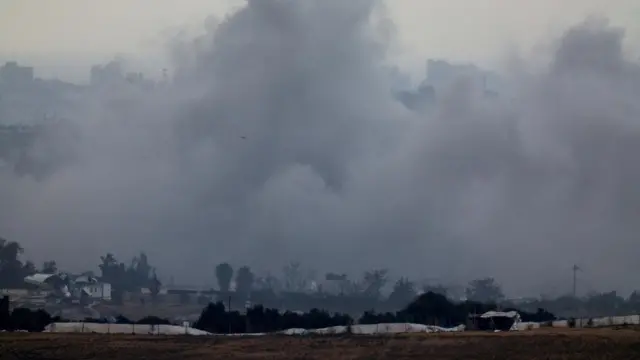 Image source, Reuters
Image source, ReutersSmoke rising after an explosion in northern Gaza today
It's coming up to 22:00 in Israel and Gaza, and 20:00 here in our London newsroom, If you're just joining us or need a recap, here are the main developments:
The Hamas-run health ministry in Gaza says at least 13,300 Palestinians have now been killed in the enclave since Israel's retaliatory attacks began.
Israel has been striking Gaza since Hamas militants killed 1,200 Israelis and took more than 200 people hostage in an attack on 7 October.
At least 5,600 children and 3,550 women have been killed in Gaza so far, the health ministry in Gaza says.
Our colleagues at BBC Verify have explained how the dead are counted - you can read more on that here.
The Israel Defense Forces (IDF) says it has carried out an air strike on "operational headquarters and terrorist infrastructures" of Hezbollah in Lebanon.
Posting on social media, external, the IDF said the strike was in response to earlier launches towards Israel by the Iranian-backed Islamist group.
Earlier, it also said it responded to rocket fire from Lebanon - and Hezbollah claimed responsibility for some strikes into Israel via its Al-Manar TV channel.
The BBC has not independently verified the claims.
Hezbollah opposes Israel's presence in disputed border areas in the region. Since the Hamas attack on 7 October, the group has been attacking military positions in northern Israel.
You can read more about the history of Hezbollah and Israel here.
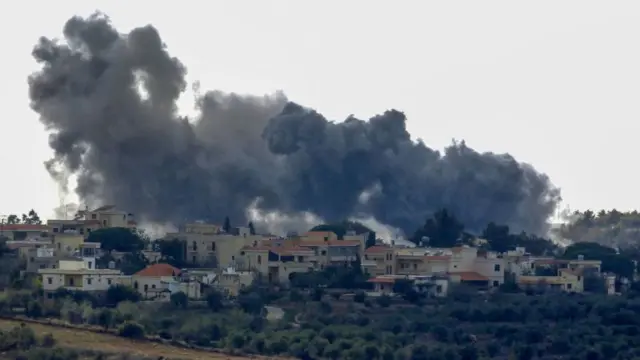 Image source, Getty
Image source, GettySmoke was seen billowing from the Lebanese village of Alma al-Shaab today, as Israel said it had responded to cross-border attacks
The head of the World Health Organization (WHO) has said he is "appalled by an attack on the Indonesian Hospital in Gaza".
Writing on X, external, Tedros Adhanom Ghebreyesus, said the incident had reportedly resulted in "12 deaths, including patients, and tens of injuries, including critical and life-threatening ones".
As we've been reporting, the Hamas-run health ministry says 12 people were killed in an Israeli airstrike there - and the BBC has verified footage showing Israeli tanks near the building.
The Israeli military has said its forces were fired on from "within the hospital" and troops targeted the source of the fire.
In the same post, Ghebreyesus said health workers and civilians "should never have to be exposed to such horror, and especially while inside a hospital."
 Tom Bateman
Tom Bateman
Middle East correspondent, reporting from Jerusalem
That a hostage deal is near is significant to hear from the mouth of Joe Biden.
We've been getting positive signals recently, from the Israeli ambassador to Washington, Michael Herzog, who said something similar to Biden. And the Qataris are saying they think a deal is pretty much done, aside from small details.
My sense - talking to a figure familiar with the talks around a fortnight ago as a deal was still being worked up - is that the two sides would be looking at a kind of phased release.
So you would have, perhaps, a smaller number of hostages released to start with, alongside a ceasefire. If that ceasefire holds, more hostages could be released.
Elsewhere, it’s been suggested part of the package could be the release of some Palestinian prisoners held by Israel, possibly women and minors.
There have been no releases of hostages since the four (in two sets of two) who were released early on in the war. They were handed over to the Red Cross who then delivered them to the Israeli side.
There are a lot of logistics to work through, as this is now much more of an active war zone on the ground than it was during that earlier period.
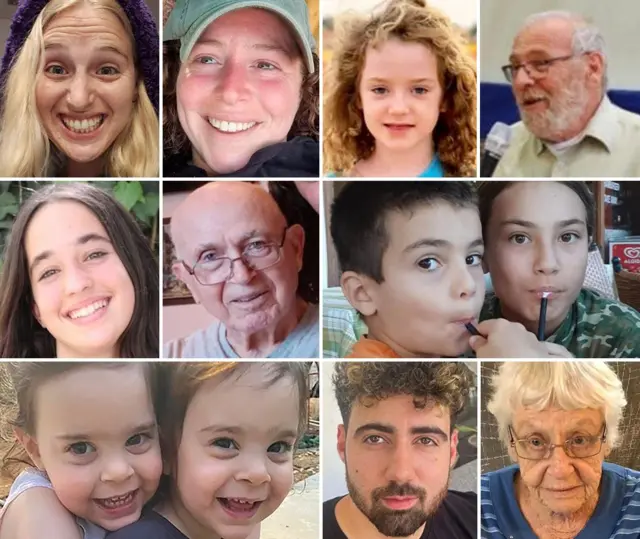
Some of those abducted by Hamas, L-R from the top: Doron Steinbrecher, Shani Goren, Emily Hand, Alex Danzig, Gali Tarshansky, Amiram Cooper, Erez and Sahar Kalderon, Emma and Julie Alony Cunio, Guy Gilboa-Dalal and Ditza Heiman.
Of the 28 premature babies who were evacuated to Egypt from al-Shifa hospital on Sunday, 12 have now been flown to Cairo, the World Health Organization (WHO) says. Others are receiving treatment at al-Arish hospital, as we've been reporting.
In total, 31 premature babies were evacuated from al-Shifa. The three who didn't go to Egypt are receiving treatment at the Emirati Hospital in southern Gaza, according to the recent post from WHO chief Tedros Adhanom Ghebreyesus, external.
"All babies are fighting serious infections and other conditions, and need specialised medical care," Ghebreyesus says.
The charity Médecins Sans Frontières (MSF) - also known as Doctors Without Borders - says its clinic in Gaza City came under fire this morning, when more than 20 people were inside.
"Our colleagues saw that a wall was torn down and part of the building was engulfed by fire as heavy fighting took place all around it. An Israeli tank was seen in the street," the charity said in a statement.
The statement added: "An MSF member of staff and 20 family members are in the clinic and in extreme danger; we don’t know their status."
MSF said four clearly marked vehicles were burned, and another "broken in two pieces as if crushed by a heavy-duty vehicle or a tank".
The charity said over 50 other people - including MSF staff and a wounded person in need of medical attention - remained in nearby buildings.
The BBC has asked the Israeli military for a response to the statement.